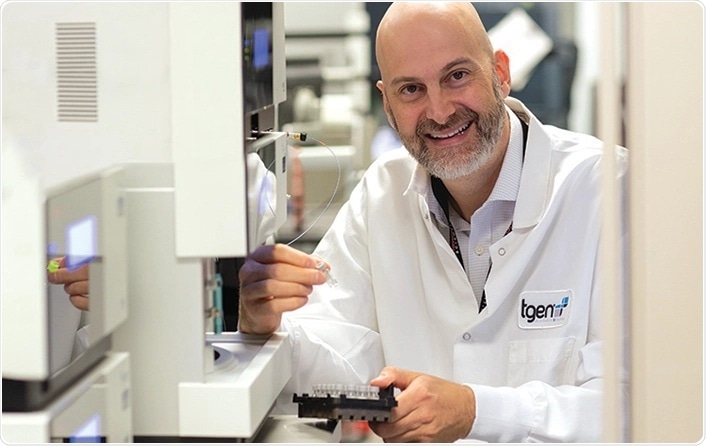According to the results of a study headed by the Translational Genomics Research Institute (TGen), even the initial stages of breast cancer could be identified much earlier and more precisely than existing methods using blood specimens and exclusive proteomics-based technology. TGen is an affiliate of the City of Hope.

Image Credit: The Translational Genomics Research Institute.
Patrick Pirrotte, PhD, Assistant Professor and Director of the Collaborative Center for Translational Mass Spectrometry at TGen, and an international research team have created a test that can identify infinitesimally tiny biomarkers of breast cancer that are released into the bloodstream from cells surrounding the tumor, called extracellular matrix (ECM). The results of their study were recently published in the scientific journal, Breast Cancer Research.
For many years, physicians have depended on breast imaging mammography to search for cancer in an attempt to facilitate prevention and early detection, and also to mitigate mortality. However, the unplanned consequences of both false negatives and false positives have thwarted the hoped-for gains of this inaccurate form of screening, such as cardiovascular disease and surgical complications, and needless biopsies of what turn out to be actually benign lesions.
ECM is essentially a network of molecules—like glycoproteins, enzymes, and collagen—that provide biochemical and structural support to neighboring cells, including tumor cells. But these proteins and protein fragments, which create the tumor microenvironment, leak into the circulating blood during the early stages of cancer.
Our data reinforces the idea that this release of ECM components into circulation, even at the earliest stages of malignancy, can be used to design a specific and sensitive biomarker panel to improve detection of breast cancer. Using a highly specific and sensitive protein signature, we devised and verified a panel of blood-based biomarkers that could identify the earliest stages of breast cancer, and with no false positives.”
Patrick Pirrotte, Ph.D., Study Senior Author, Assistant Professor, and Director, Collaborative Center for Translational Mass Spectrometry, The Translational Genomics Research Institute
To determine this protein signature, the team used blood samples taken from 20 patients afflicted with IDC breast cancer and 20 non-cancer patients who nevertheless had positive mammograms but benign pathology at biopsy. These findings were evaluated against five sets of people diagnosed with other forms of cancers, such as colon, prostate, lung, ovarian, and melanoma.
Since the number of ECM molecules in the blood is comparatively low, the team focused on proteomics and novel sample-enriching methods, such as the use of hydrogel nanoparticles, to precisely identify cancer-associated biomarkers.
This approach attaches ECM proteins associated with the migration, proliferation, adhesion, and metastasis of cancer or cancer metastasis from one part of the body to another. A number of these proteins have never been seen in blood samples before.
Our study results show a high degree of specificity of those markers as circulating proteins in breast cancer patients. Our results justify further studies with larger groups to evaluate whether this biomarker panel improves the positive predictive value of mammography for breast cancer detection.”
Khyatiben Pathak, Ph.D., Study Author and Staff Scientist, Collaborative Center for Translational Mass Spectrometry, The Translational Genomics Research Institute
Source:
Journal reference:
Fredolini, C., et al. (2020) Shotgun proteomics coupled to nanoparticle-based biomarker enrichment reveals a novel panel of extracellular matrix proteins as candidate serum protein biomarkers for early-stage breast cancer detection. Breast Cancer Research. doi.org/10.1186/s13058-020-01373-9.